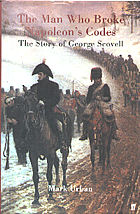Book
Review:
The Man Who Broke Napoleon's Codes
By
Mark Urban
 There
is a richness of biographical pickings for those interested in
the Napoleonic Wars and a recent addition is both eye-opening
and an enjoyable read.
There
is a richness of biographical pickings for those interested in
the Napoleonic Wars and a recent addition is both eye-opening
and an enjoyable read.
The
Man Who Broke Napoleon's Codes follows the career of George
Scovell, a man who not only had to the battle class prejudice
of his own commander, but also break the Great Cipher of France.
Scovell
was an ambitious man who wanted to better his prospects by achieving
high rank in the British army.
He
was intelligent, a master of languages and, although 35 years
old, was only a deputy-quartermaster's assistant. His purchase
of a captaincy in the 4th Dragoons had hurt his finances and did
not seem to be helping to achieve his goal of promotion.
His
ability, energy and attention to detail, however, won him command
of thew corps of Guides, which carried despatches for the army's
headquarters, and from there his climb gained momentum.
Joining
the staff, he added to his responsibilities - and pay - a number
of official tasks, which included overall command of the Duke
of Wellington's communications.
This
then evolved into a vital, but seemingly thankless, task of cracking
the French codes used by the commanders there to communicate with
Paris.
Initially
basic, the codes gave details of French units and how the bickering
marshals were loath to help a colleague if it would not benefit
themselves.
Scovell's
language skill helped him with the easy ones - some 150 numbers
- and then came the Great Cipher of 1400 numbers.
It
was difficult and painstaking work, and often required logical
guesswork to surmise the contents, but Scovell gradually deciphered
the code to the level it could assist Wellington's operational
plans.
Mark
Urban has written a wonderful book that in a very readable way
gets right into Wellington's headquarters and details a unique
side of Napoleonic warfare.
The
intelligence war, so disparagingly denied by Wellington in public,
gave him a major advantage in deciding when to give, or avoid,
battle.
Of
particular interest to students of the period will be his fascinating
descriptions of how Wellington behaved at crucial times before
the attacks on Ciudad Rodriguez, Badajoz and Burgos, as well as
Salamanca and Vitoria.
Despite
his value to the army, Scovell never managed to achieve public
recognition from the class-conscious Wellington, although he certainly
had friends in high places.
A
nicely produced 300-plus-page book, The
Man Who Broke Napoleon's Codes has
15 lovely colour images of the major players of the Peninsular
War, an example of the Great Cipher, and paintings of Scovell
and his colleagues.
If
there is one slight problem with the book - and my copy may have
been an early review print - there are a number of major spelling
mistakes that do jar a journalist's eye.
However,
The
Man Who Broke Napoleon's Codes can
be heartily recommended for its content, writing and unique insight
into the all-conquering British army that helped
topple Napoleon Bonaparte.
-
Richard Moore
9/10